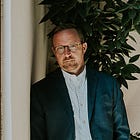Recently, I was scrolling a social media feed and happened upon a post that caught my eye. The writer shared a list of the 10 books she found most helpful when she stopped drinking, a couple of years before, and that she has since found useful in maintaining abstinence from alcohol. She also asked sober people in her network to share titles of the books that helped them most. One title was conspicuously absent.
After I skimmed the post and read her list, I went on to review the comments, wondering if anyone mentioned the one book that changed the course of my life. Alcoholics Anonymous was not featured on her list and, by the time I saw the post, it was nowhere to be found in the comments.
There is the book Alcoholics Anonymous, and there is the fellowship of Alcoholics Anonymous.
Just as someone is welcome to attend meetings of that fellowship without ever cracking the book, they can read the book, and they need not ever say anything resembling “I’m John (or Jane), and I’m an alcoholic,” let alone do so in a room full of strangers.
As an addiction professional, one service I provide is private coaching for people leaving residential treatment for a substance use disorder. Treatment providers refer clients directly to me. I support them in integrating back into daily life and, hopefully, transitioning from the initial stages of abstinence to long-term recovery.
I’ve distinguished myself from other recovery coaches in a couple of ways. First, I connect with people when others can’t. This comes in handy with guys who are shut down and disconnected from their emotional experiences. Secondly, unlike many other coaches facilities might refer to, I won’t cram the Twelve Steps down a person’s throat.
I do teach Twelve-Step principles to the people I work with, but like any good writer, I know my audience and I avoid using jargon. I know bombarding them with AA slogans and recovery-oriented aphorisms will alienate more of them than it might help.
When I’m helping someone, I keep in mind that I’m not talking to an alcoholic or a drug addict or a codependent, I’m talking to a human being.
I got sober in 1996. At that time, if you had a problem with alcohol and wanted to stop drinking, you had a couple options. There was no social media. So, there was no dry January. There was no finding a supportive sober community on Facebook, or Instagram, or Substack. You could either go to AA, or you could go to church, and it was understood in recovery circles that the former worked far better than the latter. If you chose to do neither, it was probably only a matter of time before you drank again. In that case, if you had the luxury of a next time, hopefully you would choose differently.
The modern world offers more pathways to recovery than ever before. Plenty of people achieve continuous abstinence from alcohol without ever stepping foot in a Twelve Step meeting.
At 23 years old, I had no interest in being relegated to some obscure subculture, consisting of old men who smoked cigarettes and drank bad coffee in church basements. But I desperately wanted to stop drinking. And I was told that a legend in the field of substance abuse treatment, Father Joseph Martin, had a saying – AA is what works best for most people. I believed it then and I believe it now.
Having worked in the field for more than two decades, and having met countless people confounded by alcoholism, often in their worst moments, I know most people can’t envision themselves as happy members of the Twelve Step community. As much as there is a stigma associated with addiction that keeps people in denial and dissuades them from confronting their problems, there is another stigma, borne of popular culture, that deters people from attending self-help meetings, or mutual support groups.
Often, the depictions of Twelve Step meetings we see in films and on television are cliché and unrealistic.
Character development leans hard on stereotype and generally portrays recovering people as pathetic and weak. We see sad people who make life harder for everyone who loves them. They are walking, talking burdens who inevitably screw up, again, if they don’t go to those meetings with those people, and they often succumb to their demons despite having a lot of support.
No one wants to be that person. Now, when people stop drinking, they know they don’t have to be. They can recover from alcoholism without the risk of ever becoming that poorly written movie character; without ever wandering into a Twelve-Step meeting.
The 23-year-old in me pines for those options. He would have loved to find a community of sober writers, on a platform like Substack, who could guide him toward a better life. But I’m not sure that would have gone so well. Like so many people I encounter, I would have skipped the meetings, too. In doing so, I would have thrown out the baby with the proverbial bath water without even realizing it.
I suspect the version of me who doesn’t read “the Big Book,” who doesn’t apply what he learns from it to his life, doesn’t ever quite find a way to get sober and make it stick. He never finds peace, let alone happiness. He surely does not become the man I am now.
Know this. As difficult as it is to stop drinking, it is even more difficult to stay sober. If you can’t seem to stop, or if staying stopped is troublesome, or painful, reading a particular book will certainly help. If nothing else, you might feel seen in a way you never have before. That book is entitled Alcoholics Anonymous: How Many Thousands of Men and Women have Recovered from Alcoholism.
You may not be familiar with the book or the nature of its content. You may presume it is every bit as trite as the fictional scenes of self-help meetings you’ve seen on TV. It is not.
It is not theory. It is not the depiction of one person’s battle with alcoholism. It is much bigger, and much more useful. It is a book based on the idea that one human being who suffers from a tragic affliction can overcome it by helping another person who suffers from the same. It contains first-hand accounts from people who attest to the veracity of that concept.
The book also introduced the world to the Twelve Steps, which are nothing more than a list of suggestions. Those suggestions only made that list because every single one of the first 100 anonymous members of a group of chronic alcoholics who somehow managed to achieve continuous sobriety took them. That is how the Twelve Steps originated.
If you have a problematic relationship with alcohol, and you know your life would be better without it, you might consider reading the book. I promise it won’t turn you into a cliché. You don’t have to go to those meetings with those people. You don’t have to smoke cigarettes or drink coffee. You don’t have to tell anyone.
You can read the book Alcoholics Anonymous without ever attending a meeting of Alcoholics Anonymous. If you’re anything like me, that would be a good idea. You can read about the Twelve Steps. You can follow some of the suggestions if you want. Chances are it will help you.
In my 28 years of continuous sobriety, and in helping other people find it, I never met anyone who wanted to work the Twelve Steps. Like me, a lot of them did it anyway.
I’ll tell you what else I’ve witnessed, living in this little world that people like me try so terribly hard to avoid.
I have never met anyone who worked the Twelve Steps who wishes they hadn’t.
Hey folks,
Thanks for reading The Sober Path. Stay tuned for my podcast by the same name. If you appreciate this post, please share it with someone who might benefit from it.















A not so tiny rant.
I've been really disappointed and upset with the amount of disinformed vitriol the Program (AA) receives in social media spaces.
I recommended it to someone in a local sub Reddit and was absolutely bombarded by comments calling it a parasitic religion or a cult.
It is none of those things.
I very patiently addressed every question and accusation and ended up getting blocked and banned! It was a very off putting experience.
And it's not just randos on Reddit.
I've heard Sam Harris (among others) put down AA by saying that statistics show that statistically, people have a better chance of quitting on their own than through AA.
This is such insanely flawed reasoning that it's hard to even take it seriously.
The Program is for people who have been consistently UNABLE to quit on their own.
If someone can just stop drinking on their own, they don't need AA.
It's like saying a doctor who specializes in trying to cure hopeless, incurable diseases, doesn't have a very good track record. 🤦♂️
Yeah! Because they are trying to do the impossible. They are trying to produce a miracle!
If they save a handful of lives, it's a miracle.
Anyway, thanks for letting me rant.
❤️
J.
I’ve not read the Big Book, but I’m so grateful of its existence because it laid the foundation for other 12 step programs. Though it was written 86 years ago, it’s still relevant today.